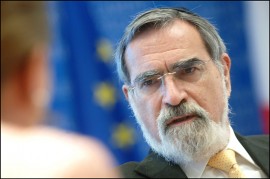
One of the things that has been hard to explain in the debate about the European constitution is the nature of the change that it represents. On the one hand, it would be based on the existing treaties, with many of the same features and structures, so it can be thought of as the continuation of a spectrum along which the European Union has travelling for 50 years.
On the other hand, there is something distinctly different about a constitution that marks it out from being just another treaty. The difference is not in the words, nor in the literal meaning, but lies in the sense and purpose behind it. A constitution is an expression of political togetherness, the willingness to act in a shared and mutual manner. (I am writing this without resort to the formal words and definitions of political science, because they would in turn need to explained and defined. The whole point is that a constitution has a significance outside that jargon and those definitions.)
A constitution has within it the implication that future, unforeseen challenges will also be dealt with together. A treaty, on the other hand, is to be taken literally. I have written before about the Montreux convention governing the Bosphorus and Dardanelles: because it does not include any provisions on safety (it was written in 1936), it cannot be interpreted as having any now. That is what I mean about the literal interpretation of a treaty.
These two different ways of looking at the difference between a treaty and a constitution are not strict alternatives: either one or the other. The best approach to take might depend on the situation. Think about the duality of wave and particle – sometimes it is best to think of an electron as a wave, sometimes as a particle, but it remains the same electron – and the complexity of the difference between a treaty and constitution starts to make a bit more sense.
A helpful explanation of the difference was made in the European Parliament last week in a speech by the Chief Rabbi, Sir Jonathan Sacks. There, he spoke of the difference between a contract and a covenant. (He was not referring explicitly to treaties and constitutions, but the point is the same and it is a good one.)
Read the whole speech here or the most interesting extract here.
His simple definition is this:
“A contract is made for a limited period, for a specific purpose, between two or more parties, each seeking their own benefit. A covenant is made open-endedly by two or more parties who come together in a bond of loyalty and trust to achieve together what none can achieve alone. A contract is like a deal; a covenant is like a marriage. Contracts belong to the market and to the state, to economics and politics, both of which are arenas of competition. Covenants belong to families, communities, charities, which are arenas of cooperation. A contract is between me and you – separate selves – but a covenant is about us – collective belonging. A contract is about interests; a covenant is about identity. And hence the vital distinction, not made clearly enough in European politics, between a social contract and a social covenant: a social contract creates a state; a social covenant creates a society.”
In that sense, the difference between a treaty and a constitution is a moral one, not a political one at all. It is whether countries participate for their own benefit or for the benefit of others. It turns federalism from merely being a different form of discussion about international relations to a proposition about the nature of politics as a whole. Federalism can give citizens rights, and protect the environment, and free up markets, and all those other good things too, precisely because it approaches politics and institutions in a different way. That perhaps is why it is so hard to argue for.
